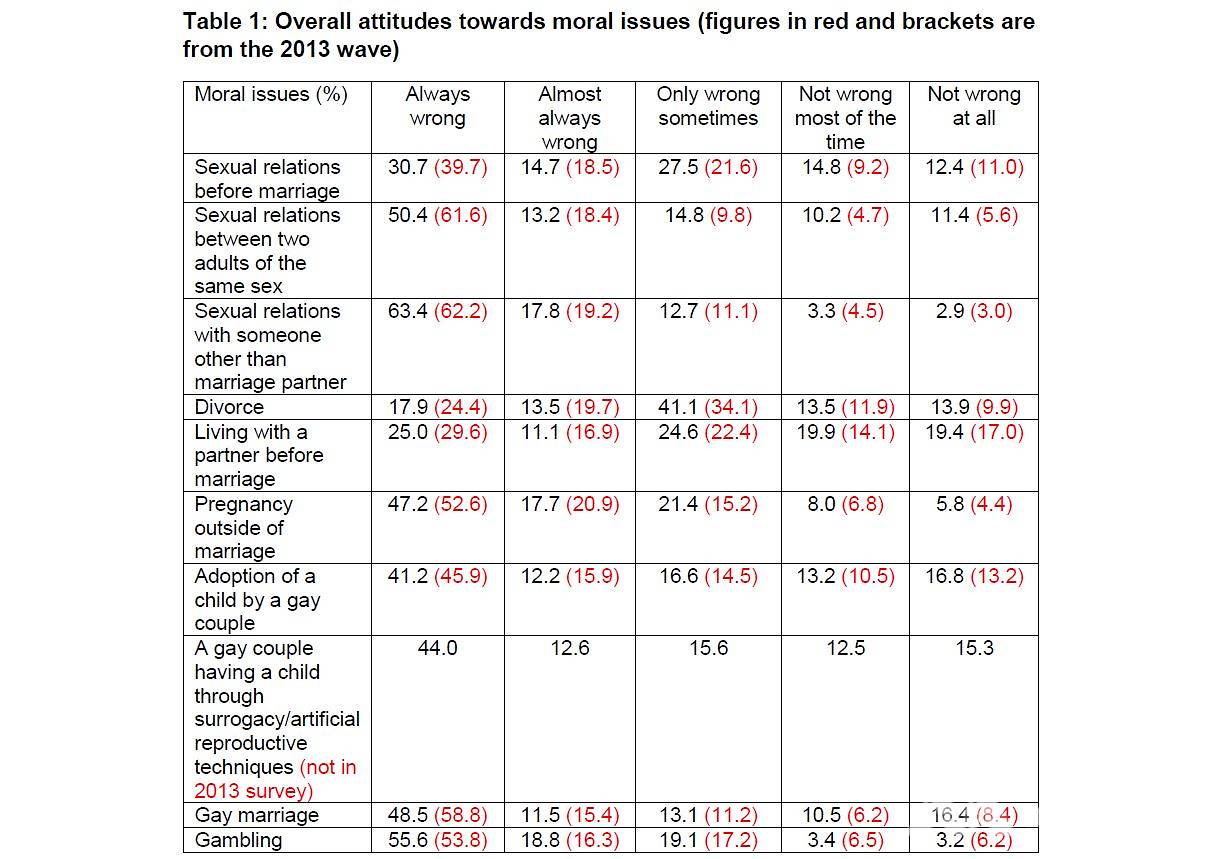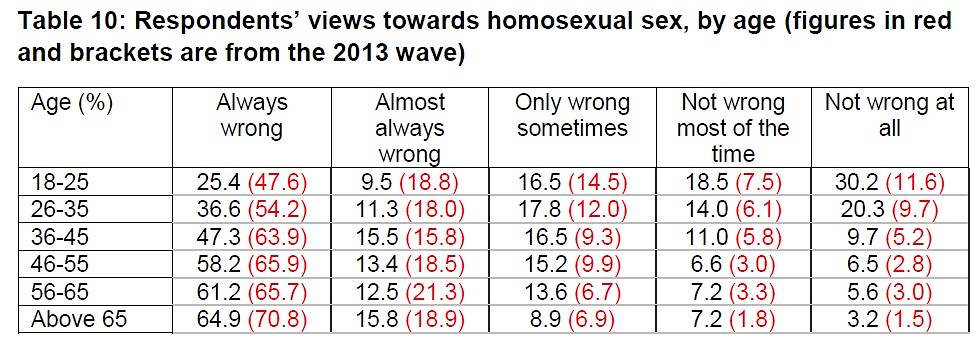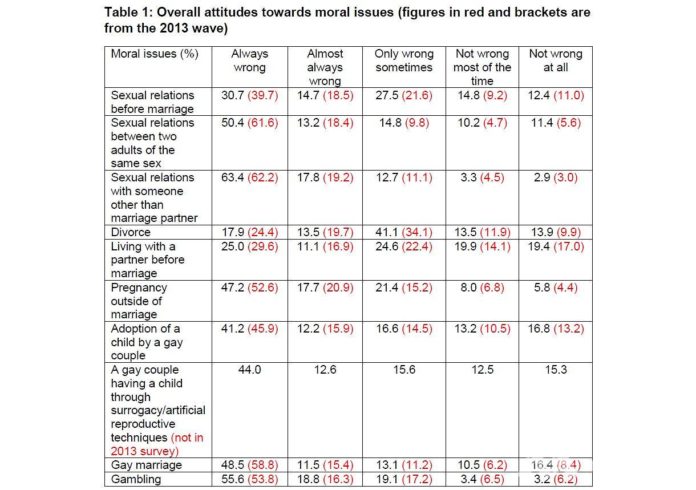SINGAPORE: While Singapore remains a “fairly conservative” society, there have been “distinct shifts” on issues surrounding homosexual rights, according to an Institute of Policy Studies (IPS) working paper released on Thursday (May 2).
The paper titled Religion, Morality and Conservatism in Singapore was co-authored by three researchers at the institute. Data for the paper came from a survey on Race, Religion and Language conducted between August 2018 and January 2019 on 4,015 Singaporeans and permanent residents. It was the second such survey since 2013.
The study sought to gather their attitudes towards social and moral issues such as homosexual sex and marriage, gambling, infidelity and freedom of speech.
In general, younger respondents had more liberal attitudes than their older counterparts, the study found.
Nearly six in 10 (58.4 per cent) of those aged between 18 and 25 indicated that gay marriage was “not wrong at all” or “not wrong most of the time”, compared to only one in 10 (9.6 per cent) respondents aged 65 and above.
On the whole, 26.9 per cent of those surveyed thought gay marriage was “not wrong at all” or “not wrong most of the time”.
This liberalism was also reflected among the respondents who were more educated, IPS said. However, respondents who identified themselves as being Christian or Muslim tended to be more conservative, it added.
SINGAPORE BECOMING LESS CONSERVATIVE ON HOMOSEXUAL ISSUES
Comparing findings from surveys done in 2013 and 2018, IPS said the Singapore population “has become less conservative over time”.

Overall attitudes towards moral issues taken from working paper on Religion, Morality and Conservatism in Singapore, May 2019 (Source: IPS)
On homosexual sex, 63.6 per cent of respondents indicated it was “always wrong” and “almost always wrong” in the most recent survey, down from 80 per cent in 2013, while 60 per cent indicated similar sentiments for gay marriage, compared to 74.2 per cent five years ago.
IPS found that there were “steep drops” in opposition towards homosexual sex among respondents below 35 years old.
One in three (34.9 per cent) 18 to 25-year-olds and nearly half (47.9 per cent) of 26 to 35-year-olds felt homosexual sex was “always wrong” or “almost always wrong” in 2018. This had fallen from 66.4 per cent for 18 to 25-year-olds and 72.2 per cent for the latter in 2013.
For 18 to 25-year-olds, the proportion who felt homosexual sex was “not wrong at all” nearly tripled – from 11.6 per cent to just over 30 per cent in 2018.
Respondents who had a Bachelors or Masters degree saw the steepest falls in disapproval towards homosexual sex.

Respondents’ views towards homosexual sex taken from working paper on Religion, Morality and Conservatism in Singapore, May 2019. (Source: IPS)
INFIDELITY, GAMBLING STILL FROWNED UPON
A majority of Singaporeans perceived that infidelity (81.2 per cent) and gambling (74.4 per cent) were “always wrong” or “almost always wrong”.
IPS said that there were “no distinct differences across time across all age cohorts”, on these two issues.
“The findings on young respondents’ views towards gambling and infidelity, in contrast to gay rights issues, show that they are not liberal when it comes to all issues, and that there is still some discernment in their application of a liberal lens,” the IPS researchers – Dr Mathew Mathews, Mr Leonard Lim and Ms Shanthini Selvarajan – said.
“The case of gay rights issues might be unique, given growing activism over the years as seen in social movements such as Pink Dot, activism in other countries as seen in the legalisation of same-sex marriages in countries such as India, as well as increasingly positive portrayals of LGBTQ individuals in media.”
Based on its findings, IPS said that while the majority of Singaporeans remain conservative towards gay rights, if the trend towards more liberal attitudes among the young continues, certain social policies will have to be relooked.
One such policy IPS cited was Section 377A of the Penal Code, which criminalises gay sex between men.
IPS also said that “multiple areas of friction between camps that hold vastly different beliefs on issues” could emerge when it comes to gay rights.
It added: “To prevent this friction from escalating into full-fledged conflict, any changes to legislation would have to be managed delicately.”
INFLUENCE OF RELIGION ON MORAL ISSUES
IPS found that Muslims and Christians were the most likely to think that infidelity was “always wrong” or “almost always wrong”. For both religions, 91 per cent of respondents from each community had such sentiments.
The trends for respondents’ opinions towards sexual relations before marriage were similar.
There were lower levels of conservatism among Buddhists and those with no religious affiliation – less than a third of Buddhists and only around one in five of those with no religion had similar sentiments.
Divorce, meanwhile, was viewed most liberally among Singaporeans, with more than 31 per cent of respondents indicating that getting a divorce was “always wrong” or “almost always wrong”, down from 44.1 per cent in 2013.
SOCIO-POLITICAL ISSUES
On socio-political issues, respondents were overall neutral, but tended slightly closer to the position emphasised by the Singapore “state ideology”, IPS said.
For example, on freedom of speech, around four in 10 respondents identified with the position that people should be careful when speaking about sensitive topics, compared to around three in 10 who felt that people should be allowed to speak freely on any topic.
Respondents also appeared to value Asian values such as filial piety, with 57 per cent strongly or slightly agreeing that the younger generation should take care of the older generation, compared to 15.6 per cent who said that each generation should take care of itself.
In addition, respondents valued the multi-cultural, multi-racial and multi-religious diversity of Singapore.
Forty-four per cent identified with being accommodating towards people of different backgrounds, while 17.8 per cent aligned with the position of getting everyone to conform to achieve greater unity.
IPS found that around four in 10 strongly or slightly identified with the position of rootedness in the values of Singapore, describing it as “encouraging”.
Despite the shift in attitudes towards moral issues, it noted that values such as filial piety, multiculturalism and national pride are still being championed.
“This is a positive sign of a distinct Singaporean identity shared by people of diverse backgrounds, grounded on certain sets of core values and principles that may remain unwavering across time,” said the researchers.





